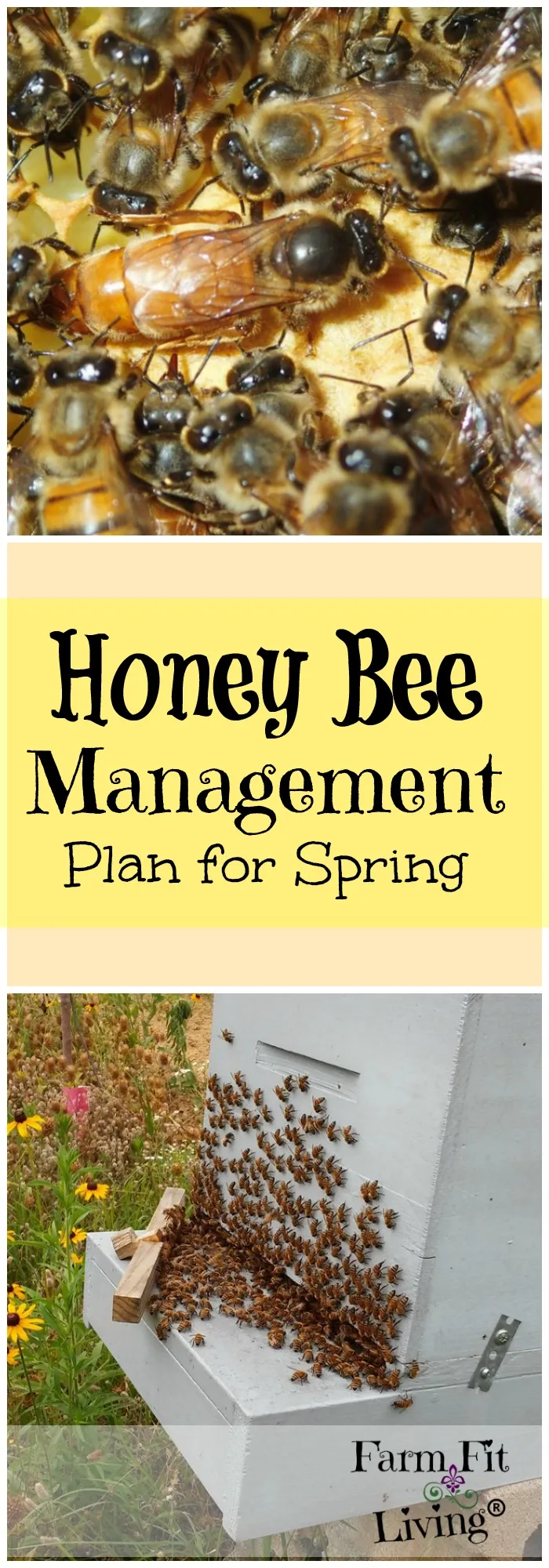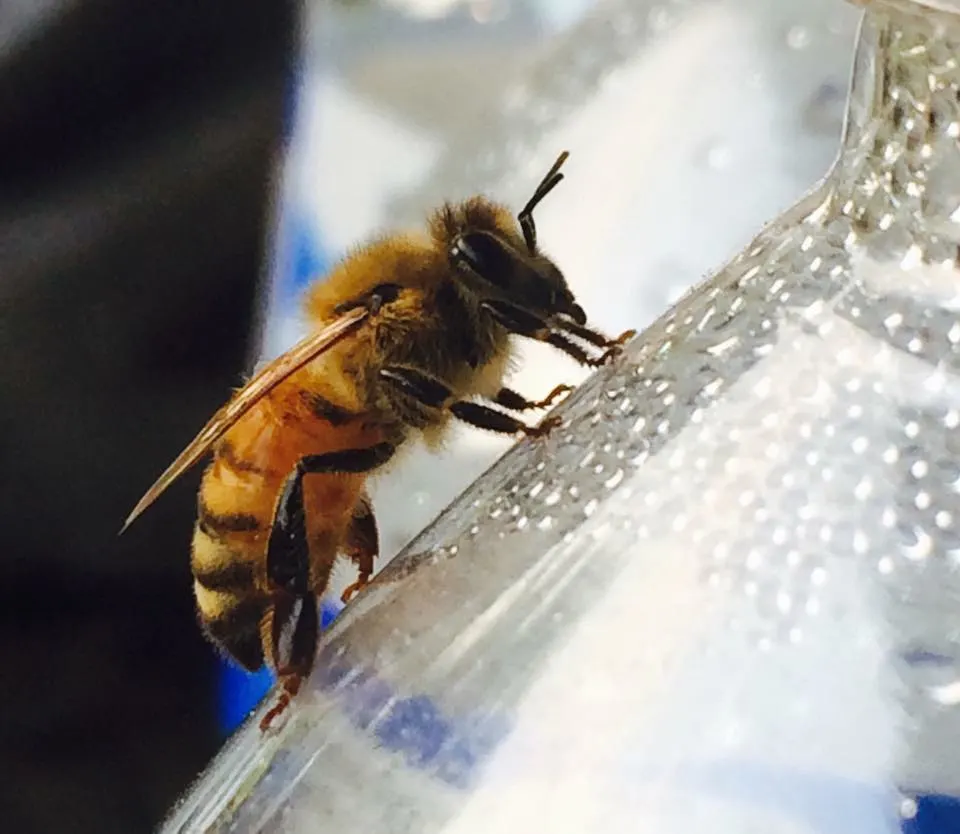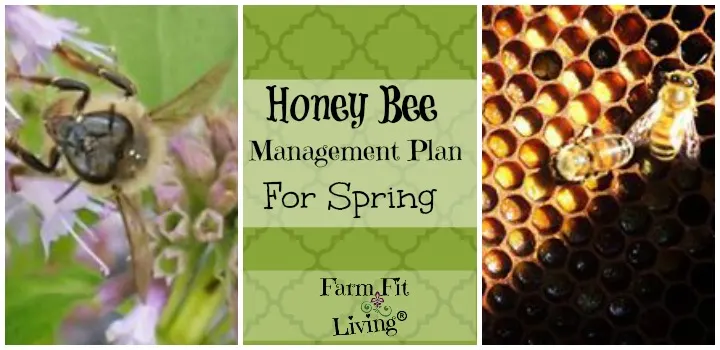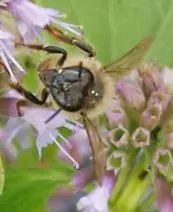Spring is almost here. Do you know where your bees are? How about making a honey bee management plan?
Honey bee management plans should be in the works before spring arrives. You should have a plan in place for when that weather starts to get warmer.
Why? Because when it comes to seasonal management of honey bees, Spring is actually the most crucial time for honey bee management practices:
- There’s some serious housekeeping to be done inside the hive.
- Bees are hungry and there’s nothing for them to eat yet.
- Bees will swarm (fly away) if they don’t have what they need.
So, timing is very crucial to be preparing for late winter and early spring. Here are some beehive management tips to become really prepared with a honey bee management plan for spring. It starts with getting your equipment ready for the new season.
Listen to the Podcast Episode Here:
First of all, Take inventory of your Equipment
Have you seen your beekeeping equipment since you wintered the hive last Fall? You’ll need to know what to do with hives in the spring before the season arrives.
You might want to go ahead and dust off your smoker and hive tool. Here are some other questions you should be asking about equipment:
- Do you have enough boxes? Beekeeping frames? There’s always a chance you’ll need to catch a swarm so be prepared.
- Need any extra beekeeping suits? Gloves?
- What kind of equipment should you replace or upgrade?
Check out my Beekeeping Equipment List. It contains everything I invested in to get started in bees. And it is the list that my mentor gave me because he felt that these items were things I couldn’t keep bees without. So, every piece of equipment is highly recommended by my own mentor.
Beekeeping equipment shopping can be a bit overwelming. However, an essential part of keeping bees is to having the right equipment on hand to help keep you safe from bee stings.
Here are a few places you can order equipment online:
And keeping the bees fed and safe equals happy bees!
Next, I’ll discuss feeding the bees.
Next, plan to feed the Bees
As you begin to use your equipment to conduct your first hive checks of the season, you might notice the bees are a little short on honey and candy board. So, what do you do.
Umm…easy. Feed them. And plan to feed them in several ways through the year as needed. But, definitely before Spring hits because not much is blooming. And the bees are more than ready to work.
So, here are three ways I enjoy feeding my bees a little extra:
- Put out some sugar syrup. I prefer to use a 2:1 sugar syrup in the feeders.
- Plant vegetation bees like. We plant flowers, such as lavender and legumes, such as clover.
- Do NOT Destroy dandelions. They are some of the bees first food.
Read more on how we feed our bees.
Next on the list is double checking the hives to make sure all is well inside the hives.
Check the hives
When you do your hive checks, there are some questions to keep in mind.
- Is the colony strong?
- Where’s the Queen? Do you need to requeen the hive?
- How many Queen Cells are there?
- Disease or Mite Symptoms
- How much Honey supply
- What about the candy board supply?
If there are problems inside the hive, you’ll have some decisions to make. If the hive is weak or dead, you’ll need to meet with your mentor or other local beekeepers to determine the next steps.
The reason I give this suggestion is because these other beekeepers are local plus, they’ve been around a while. They already know the answers and are more than willing to help you solve your hive problems. How?
Well, let’s start with the local hive group.
Then, attend your local honey bee management meetings
If you aren’t meeting with your local honey bee management group, you are definitely missing out. What is this group I speak of?
Well, a local group of beekeepers in your area that meets on a regular basis. I am very fortunate to have one near me that I meet with regularly. There are numerous reasons why a local honey bee management group can be valuable to you:
- First of all, idea sharing
- Or, trouble shooting problems
- And, celebrating victories.
- Finally, learning new techniques
Your bee group can help you to become a better beekeeper. You can learn from others in the group and they can learn from you. It’s a win-win.
In fact, I enjoy and look forward to meeting with my Bee Chat group. There are around 40 of us that meet the second Thursday of the month. And there are beekeepers of all ages and stages. Everyone has a different experience to bring to the table.
So, you can bring any ideas, problems and victories to your local honey bee support group. They will be there for you to answer questions and give great advice.
But maybe you don’t have the luxury of a local group to meet with. This is a great opportunity for you to form your own group. Why not? Start with your mentor. The two of you can work together to form a group and start networking with other beekeepers in your local area.
Wait…You do have a mentor. Don’t you?
Of course, talk With Your Mentor
First of all, please tell me you have someone who has been beekeeping successfully longer than you to help you. This person is called a mentor.
So, prepare for the new season by talking with your mentor. I hope you have one no matter if you are new or if you’ve been beekeeping a long time.
No matter how much you know or don’t know, a beekeeping mentor can be an invaluable part of your honey bee management plan.
Your beekeeping mentor should be:
- First of all, local and living near you.
- Then, this mentor should be an expert you can call with questions.
- Finally, your mentor needs to be available and willing to help you.
And the number one reason to even have a mentor is to have someone to shoot ideas with. Because it’s so nice to have someone there who you can share tips and tricks. Especially during the most critical time of year when your bees run away. We’ll talk about swarming next.
Two Ways To Help Prevent Swarming
Spring is the time for swarming. And it’s natural for bees to swarm. The main reason for swarming is because of pressure and crowding within the hive. But also because they ran out of food.
So, there are a couple of techniques beekeepers have used that help relieve that pressure and crowding inside the hive.
- First of all, reverse the hive boxes – Switch the top box with the bees to the bottom for Spring. The honey dome where the bees are acts as a natural Queen Excluder.
- Or, there’s Checkerboarding: A technique called “Checkerboarding” helps to relieve that pressure in the hive. Place new frames between combed frames. That’s a very simple description to such an important spring management tip.
Hence, I’ve included some links to excellent videos on You Tube here and here describing these two techniques. When researching the history, I have found articles and videos claiming one method to be better than the other.
Of course, each one says the other is the most horrible method…You catch my drift. So, what do you do?
Well, that’s what your groupies and your mentor is for. My advice is always to do what your neighbors are doing. Use the same methods they have been using because more than likely what works for them will also work for you.
So, really it’s up to you. Pull all your resources together and use the method to develop a honey bee management swarm plan that’s right for your bees, your location and you as the beekeeper.
And Get Ready For A New Year of Beekeeping
In conclusion, the next season of beekeeping is upon it. And Spring is such an amazing season of warmer weather and new beginnings. How exciting!
Also, how lucky we are to be living this great life as beekeepers. I don’t know about you, but every year at the end of winter, I begin to get anxious about the new season. It’s just so fun to see bees buzzing around when the weather gets warmer.
Furthermore, it makes me think about my next year beekeeping goals:
- What will the new year of beekeeping bring?
- How can I make it amazing?
- What could I do differently to make it even better than the last?
Finally, these are questions that every beekeeper should ask if they want to learn, grow and become a more successful beekeeper. I hope I’ve given you some great tips to help you develop your very own honey bee management plan for the spring season.
Happy Spring! What are your best beekeeping tips for honey bee management?







9 Reasons People Won't Keep Bees Even If They Say They Will
Friday 12th of May 2017
[…] ** Read more about Spring Management Here […]